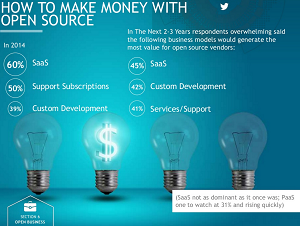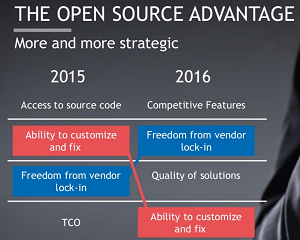News
Survey: Open Source Is 'Today's Preeminent Architecture'
- By David Ramel
- April 28, 2016
Ten years on, the Future of Open Source Survey that annually examines trends in community-developed software has deemed it "today's pre-eminent architecture, the foundation for nearly all applications, operating systems, cloud computing, databases and Big Data."
Those are the words of survey stewards Black Duck, which provides automated solutions for managing open source software, and North Bridge, a venture capital firm. Their 10th Future of Open Source Survey polled 1,300 respondents from 64 countries.
Of those, a full 90 percent reported they depend on open source software to gain better efficiency, innovation and interoperability. "The most compelling reasons cited in the survey for use of open source included flexibility and freedom from vendor lock-in; competitive features and technical capabilities; ability to customize; and overall quality," the firms said in a statement yesterday.
"When the first survey launched 10 years ago, hardly anyone would have predicted that open source use would be ubiquitous worldwide just a decade later, but for many good reasons that's what has happened," said Black Duck CEO Lou Shipley. "Its value in reducing development costs, in freeing internal developers to work on higher-order tasks, and in accelerating time to market is undeniable. Simply put, open source is the way applications are developed today. The future of open source is full of possibilities."
 [Click on image for larger view.]
Money-Maker (source: Black Duck and North Bridge)
[Click on image for larger view.]
Money-Maker (source: Black Duck and North Bridge)
Other highlights of the survey listed by the firms include:
- 67 percent of respondents report actively encouraging developers to engage in and contribute to open source projects.
- 65 percent of companies are contributing to open source projects.
- One in three companies have a full-time resource dedicated to open source projects.
- 59 percent of respondents participate in open source projects to gain competitive edge.
- Git is the overwhelming choice (73 percent) for versioning.
- More than 55 percent leverage open source within their production environments.
- Respondents reported use of open source to drive innovation through faster, more agile development; accelerated time to market and vastly superior interoperability.
 [Click on image for larger view.]
Advantages (source: Black Duck and North Bridge)
[Click on image for larger view.]
Advantages (source: Black Duck and North Bridge)
But not all was rosy in the survey findings. "The development of best-in-class open source security and management practices has not kept pace with growth in adoption," the firms said. Other survey highlights listed by the firms detail those pain points (which are addressed with Black Duck's products):
- 50 percent of companies have no formal policy for selecting and approving open source code.
- 47 percent of companies don't have formal processes in place to track open source code, limiting their visibility into their open source and therefore their ability to control it.
- More than one-third of companies have no process for identifying, tracking or remediating known open source vulnerabilities.
Both Black Duck and North Bridge have published slide shows detailing the results of the survey.
About the Author
David Ramel is an editor and writer at Converge 360.